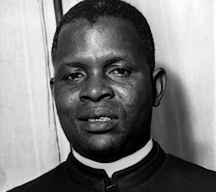- Fulbert Youlou
Infobox Prime Minister
name =Fulbert Youlou

caption =
order =1st President of Republic of the Congo
term_start =15 August 1960
term_end =15 August 1963
successor =Alphonse Massemba-Débat
predecessor =None
order2 = 2nd Prime Minister of the Republic of the Congo
term_start2 =8 December 1958
term_end2 =21 November 1959
successor2 =Post abolished, 1959–1963;Alphonse Massemba-Débat
predecessor2 =Jacques Opangault
birth_date =9 June ,17 June or9 July 1917
birth_place =Madibou, Moyen-Congo
death_date =6 May 1972
death_place =Madrid ,Spain
nationality =Congolese
party =Union Démocratique pour la Défense d'Intérêts Africains
spouse =
children =
religion =Roman CatholicAbbé Fulbert Youlou (
9 June , [In "African Powder Keg: Revolt and Dissent in Six Emergent Nations", author Ronald Matthews lists Youlou's date of birth as9 June 1917 . This date is also listed in "Annuaire parlementaire des États d'Afrique noire, Députés et conseillers économiques des républiques d'expression française" (1962). Harvnb|Matthews|1966|p=169; citation|author=|title=Annuaire parlementaire des États d'Afrique noire: Députés et conseillers économiques des républiques d'expression française|year=1962|publisher=Annuaire Afrique|location=Paris|oclc=11833110.]17 June [In "Africana: The Encyclopedia of the African and African-American Experience",Henry Louis Gates, Jr. andK. Anthony Appiah list Youlou's date of birth as17 June 1917 . Harvnb|Appiah|Gates|1999|p=2036.] or9 July 1917 [The "Encyclopedia of World Biography" by Gale Research Company lists Youlou's date of birth as9 July 1917 . Harvnb|Gale Research Company|1999|p=466.] –6 May 1972 ) was aBrazzaville -Congolese Roman Catholic priest, nationalist leader and politician.Early life
Youlou, whose last name means "heaven" in Lari, [Harvnb|Matthews|1966|p=94.] was born the son of a Lari merchant in Madibou, Moyen-Congo. He was baptized at age nine and three years later, entered a
seminary .Harvnb|Young|1999|p=2036.] He attended mission schools inGabon ,Cameroon , andMbamu , where he metBarthélemy Boganda , the future nationalist leader ofOubangui-Chari and the fist president of theCentral African Republic .He taught in mission schools in French Moyen-Congo and was ordained as a Catholicpriest in either 1946 or 1949.Harvnb|Mengisteab|Daddieh|1999|p=162.] In defiance of orders from his superiors, he ran unsuccessfully in the 1956 elections for theFrench Assembly and was then defrocked by the church. Ignoring the church's decision, he continued to wear his ecclesiastical robes. Due to his defrocking, he was acclaimed by his fellow countrymen as being a victim of discrimination, which helped launch his political career. [citation|last=|first=|title=Failure of a Fetish|url=http://www.time.com/time/magazine/article/0,9171,875095,00.html|magazine=Time|date=23 August 1963 |accessdate=2 August 2008 .] Soon after, he took control of Amicale, an anti-French, quasi-religious Lari self-help organization founded by the now-deceasedAndré Matsoua .He lost the
2 January 1956 territorial assembly elections by a close margin; he finished third with 27.6% of the vote, behind 31% for Felix Tchicaya and 29.1% forJacques Opangault . However, the loss only skyrocketed his political profile amongst the Congolese people. With his newfound support, he founded on29 May 1956 the Union Démocratique pour la Défense d'Intérêts Africains (UDDIA; _en. Democratic Union for the Defense of African Interests), apolitical party supporting close relations with France, to compete with Tchicaya's Parti Progressiste Congolais (PPC; _en. Congolese Progressive Party) and Opangault's Mouvement Socialiste Africain (MSA; _en. African Socialist Movement) parties.Harvnb|Gale Research Company|1999|p=466.] In November 1959, Youlou filed papers declaring his candidacy for the election of the mayor of Brazzaville. However, these papers were in fact supposed to be filed in Pointe-Noire. French colonial officials, knowledgeable of Boganda's drastic rise to power in Ubangui-Shari, did not want to take the risk of letting Youlou's request lapse and causing a large uproar amongst the public, so they informed him of his error. They believed that they could utilize Youlou's influence among the Lari people to their benefit.Harvnb|Bernault|1996|p=234.] Youlou won the vote of the majority of Brazzaville's Bakongo population to become the first black elected mayor inFrench Equatorial Africa . [citation|last=Gondola|first=Ch. Didier|title=The History of Congo| year=2002|publisher=Greenwood Press |location=Westport,Connecticut |isbn=0-313-31696-1|oclc=49959456|page=p. 109.] His surprise victory drastically altered the political landscape in Congo.Entrance into national government
In May 1957, he was appointed Minister of Agriculture and deputy to the provisional Legislative Assembly of the Congo by Prime Minister Opangault. [citation|last=Italiaander|first=Rolf|title=The New Leaders of Africa |year=1961|publisher=Prentice Hall|location=Englewood Cliffs,
New Jersey |isbn=|oclc=565528|page=170.] [citation|last=Daggs|first=Elisa|title=All Africa: All Its Political Entities of Independent Or Other Status|year=1970|publisher=Hastings House|location=New York|isbn=0803803362|oclc=82503|page=324.] Tchicaya's PPC collapsed almost entirely soon afterward, leaving Opanagult and Youlou as the main political contenders in the 1957 legislative elections, which resulted in astalemate . The UDDIA finally achieved a majority in Congo's legislative assembly the following year.Harvnb|Clark|Gardinier|1997|p=63.] That year, Opangault and Youlou supported political autonomy, which French PresidentCharles de Gaulle considered giving to the Franco-African Community. A change of majority in the assembly resulted in the formation of a provisional government headed by Youlou on8 December 1958 . [Harvnb|Lentz|1994|p=194.]Antagonism between the
Mbochi (who supported Opangault) and Balali (who supported Youlou) ethnic groups resulted in a series of riots in Brazzaville in February 1959, which had to be subdued by the French army. Youlou used the series of events to attack the opposition. Throughgerrymandering , Youlou's UDDIA party obtained 84% of the legislative seats after only receiving 58% of the vote in the April 1959 legislative elections. Three months later, he formed a new government, which was shortly joined thereafter by Opangault and the MSA. By the time independence was declared in the Republic of the Congo in August 1960, Opangault had agreed to serve under Youlou in a highly symbolic position.Notes
References
*.
* citation|last=Bernault|first=Florence|title=Démocraties ambiguës en Afrique centrale: Congo-Brazzaville, Gabon, 1940-1965| year=1996|publisher=Karthala|location=Paris|isbn=2865376362|oclc=36142247.
*.
*.
*.
*.
*.
*.
Wikimedia Foundation. 2010.
